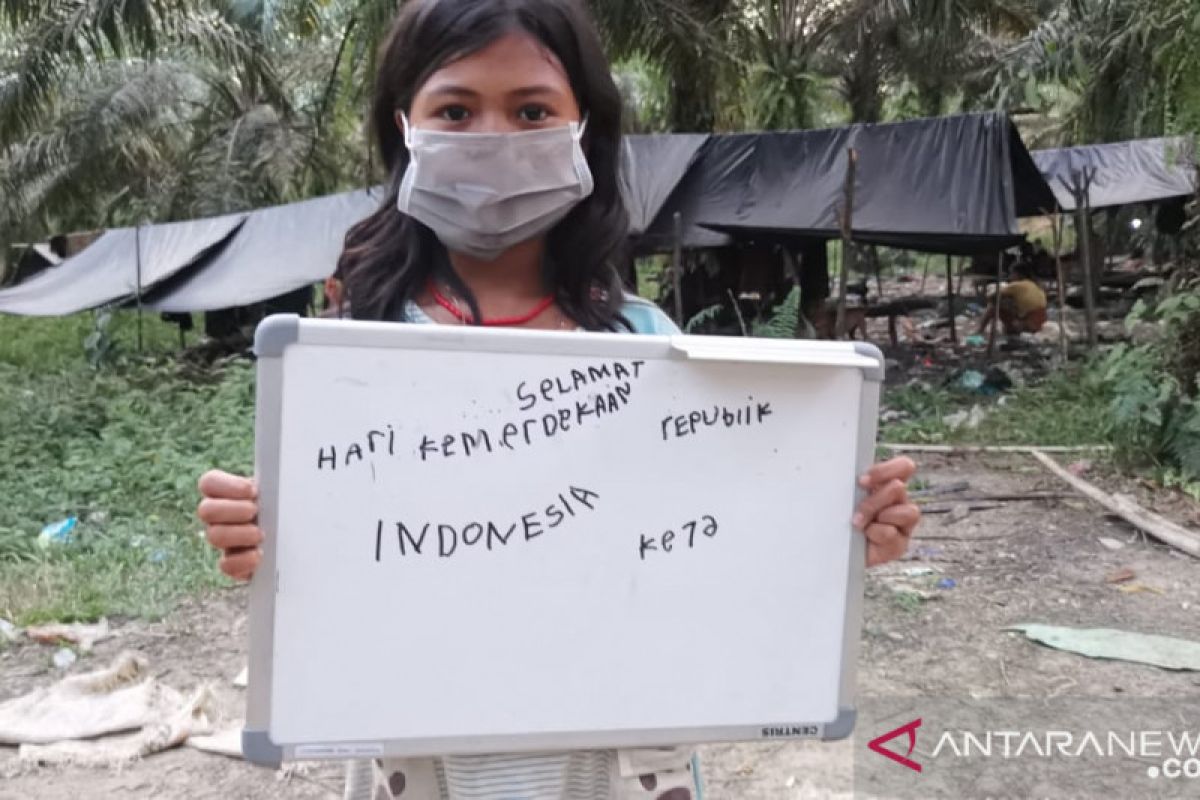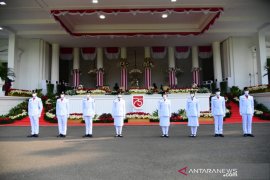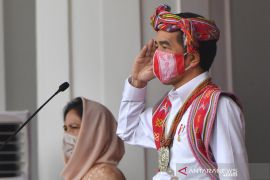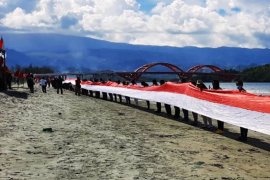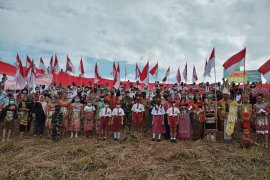We want our children to go to school like those of the villagers. Our children's new obstacle is when they just started attending school, we were told to move, and hopi ado ketetapan (we have no certain place to go).Jambi City (ANTARA) - Mali, an eight-year-old girl, struggles to write a congratulatory message on the occasion of the 76th Anniversary of Indonesian Independence. With her inverted 6 and oblique handwriting, the jungle-dweller "orang rimba" girl eventually managed to complete the message.
Mali had been attending a state elementary school near her settlement since 2020. However, hailing from a jungle-dweller or the Suku Anak Dalam's (secluded tribe's) tradition wherein she and her family have to move in keeping with the tradition of Melangun, in which when members of her group pass away, she stopped going to school.
It is common for jungle dwellers. Another reason for their displacement was being evicted from one place to another, and in the wake of COVID-19 pandemic, their chances of continuing education had dimmed, Warsi Indonesian Conservation Community Public Relations, Sukma Reni, stated in Jambi on Tuesday.
Mali, one of the several school-aged jungle children belonging to the Mariau's tribe in the PT SAL palm oil plantation, was always keen to study in school and receive education but she and her group were forced to move after being evicted by the palm oil mill owner.
Related news: VP wears Sundanese clothing for Indonesia's independence day ceremony
For a year, Mali has been studying at a formal elementary school, but the lack of stability in the jungle dwellers' life in the palm oil mill due to being often cast out made it difficult for her and her friends to go to school.
"We want our children to go to school like those of the villagers. Our children's new obstacle is when they just started attending school, we were told to move, and hopi ado ketetapan (we have no certain place to go)," Mariau, 52, noted in the tribe's dialect.
Mariau stated that according to the ancestors, their indigenous elders lived along the Punti Kayu River, Tengkuyungon River, and the White River. In this area, Mariau recollected when he was young and when dense forests were his home. Diverse jungle fruits were available for consumption, tubers were abundant, and of course, louk godong (animals) could easily be hunted.
"That was the freedom of our people when the jungle gave us life," Mariau told with a smile that beamed across his face while recalling sweet memories of experiencing freedom as a jungle dweller.
Colonized by heavy equipment
Mariau never expected that one day, heavy equipment would tear down their trees and replace them with endless palm trees.
"We were fooled, and our fruit trees were toppled. They said the palm trees would bear large, sweeter fruits, so we waited. But where is this fruit they mentioned? The palm trees' fruits come out bitter and inedible," Mariau recalled the adversity.
Since then, Mariau and his group realized that they were cheated. A strong determination to get out of nescience arose, but luck still has not sided with them.
Mariau realized that in order to get out of this deception, they had to go to school. He has tried to send his children to the elementary school nearby. However, not one of his five children regularly continues going to school.
Related news: BATAN celebrates Indonesia's Independence Day through top research
"How should we go to school? It had not even been a week, and we were already evicted and had to move again, and after we moved, where should we take our children to school?" Mariau stressed.
Hence, Mariau is optimistic that the government would provide them living space, permanent settlement, and life resources.
Mariau is a jungle dweller or from the Anak Dalam tribe group whom President Jokowi had paid a visit to in 2015. They believed that meeting the president was almost like having met God, as he once hoped to be given a place to live.
"We are waiting that our appeal made to the president will be granted," he noted.
He is hopeful that with a permanent home, he and his group would no longer be evicted by others, and so, the group would be able to build a better life.
"Our dream is that our children can become smart by having the ability to read and write because we (the adults) are not able to," Mariau said in the jungle dwellers' language.
Mariau also believes that if they had a definite residential area, education for their children could run smoothly.
Related news: Indonesia's 76th anniversary marked by research, innovation: BRIN
He noted that all his five children were keen to go to school but were always evicted before they completed learning the subjects at school. As a result, his children could not write and read well.
Mariau's aspiration is to have members like Budi, a tribe member of Tumenggung Bebayang, who successfully completed education and is now an active member of the Indonesian National Defence Forces (TNI).
For Mariau, the dream of becoming a TNI member is quite far-fetched, as the most important requirement for him right now is for his children to be literate.
Meliyau, 40, the wife of Tumenggung Mariau also recalled how her childhood was unbounded and how she roamed freely in the forest.
As a girl, her parents had taught skills that a jungle woman was required to master. Jungle women are holders of the family wealth. In her tribe, women must not only have the intelligence to manage family assets but also have mastered various forms of craft, such as creating webbed mats.
Jungle women were required to create webbed mats as a seating pad in the godong house, baskets made of rattan, and other crafts. These skills were gained and became part of the daily life of jungle women.
However, since they got married, their jungle slowly disappeared and were turned into palm oil mills, and unfortunately, these hereditary skills could no longer be carried forward.
"All the work of the jungle women was lost," Meliyau stated.
Palm oil mills do not grow rattan, which means no more red resins that would beautify the webbed baskets, she noted.
"Now, we help collect palm fruits that fall, and sometimes we do not obtain any," she pointed out.
The jungle dwellers are in a predicament. When their jungles are converted into palm oil plantations, they were unable to adapt to these changes. As a result, they experience extreme marginality.
For the jungle dwellers, the meaning of independence is the freedom to utilize the jungle's resources that can sustain their lives.
"We are the jungle people, our lives are in the jungle, in the jungle we eat, in the jungle we are preserved," according to Tungganai Basemen, 61, who is a tribe elder living in the Bukit Duabelas National Park.
Free
On the occasion of Indonesia's 76th Independence Anniversary, Basemen is optimistic that their jungles, which have shrunk in size, would be protected.
"Our hope is for the government to save our forests because they are our home," he stated.
Although living in the jungle, he aspired that the tribe's younger generation would attend school to prepare them for life and to have a good livelihood and a good future.
Meanwhile, Robert Aritonang, program manager of the Warsi Indonesian Conservation Community, assessed that jungle dwellers or secluded tribes were indigenous people that identified themselves with forests.
Related news: Goa Rangko's sunlit charm
The availability of forests is a guarantee of their identity, while the loss of forests is the loss of their identity. The jungle dwellers' determination to continue to live in forests should be maintained and supported by all parties, he emphasized.
"This support is important not only for the jungle dwellers but also vital for ecology," Aritonang remarked at Jambi on Tuesday.
As for those residing in palm oil plantations, the government should immediately take action to provide them a decent life. To solve this problem, all parties should be made increasingly aware of the rights of jungle dwellers, he stated.
"Without any awareness, the jungle dwellers, who lost their forests, will become more marginalized. Hence, it will complicate the government's work to solve the endless social conflicts," he emphasized.
On the occasion of the country's 76th anniversary, hopes are pinned high on the basic rights of jungle dwellers to their land being fulfilled. This demand is expected to be heard by the government and granted on the basis of respect and fulfillment of equal human rights.
Related news: Reading Proclamation text holds its own meaning: House speaker
Related news: President Jokowi pays tribute to fallen heroes at Kalibata cemetery
Editor: Fardah Assegaf
Copyright © ANTARA 2021
